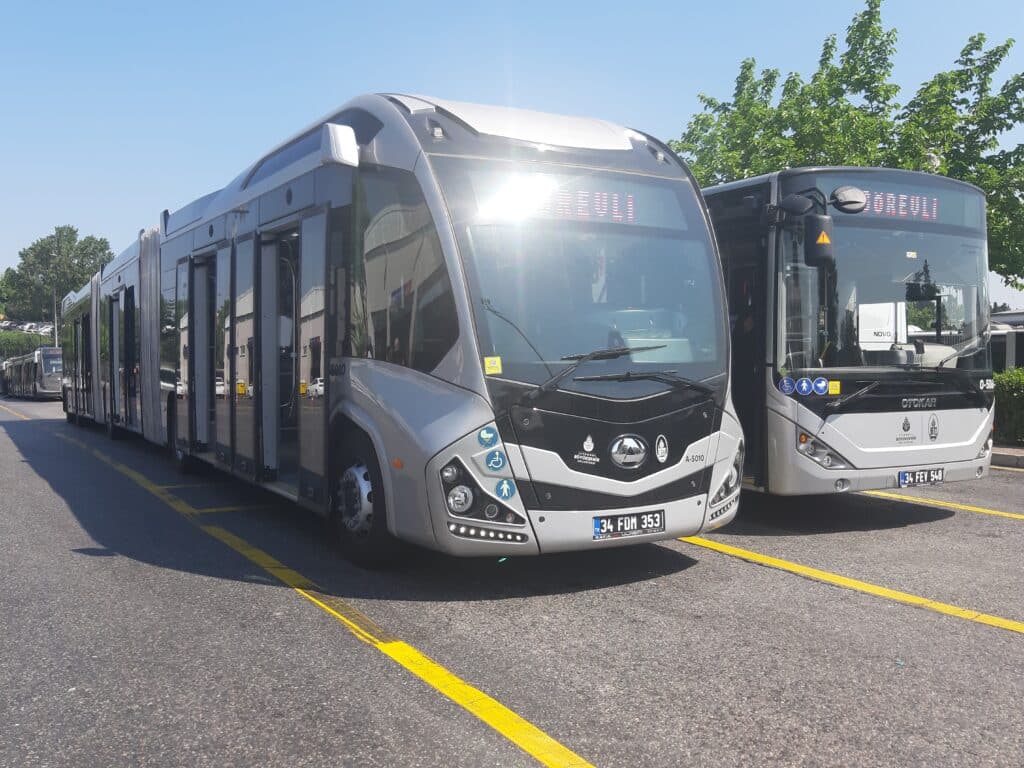Istanbul is a big city with a major traffic problem. It is ranked as being in the top ten cities in the world in terms of traffic congestion. Those who experience it would argue that it is near the top of that scale.
IETT (Istanbul Electricity, Tramway & Tunnel Company) is the main provider of Public Transport in the city. In spite of huge challenges, it is making a big impact on keeping the city and its citizens moving. Fleet Bus & Coach got the opportunity to visit the IETT HQ to get a feel on how this transport operator keeps its network moving, and to travel on one of the routes.
Operating 600 buses across its routes, over 1 million people travel on IETT’s system every day. It is a simple concept. The buses, normal urban commuter vehicles, run on a dedicated central section of roadway, similar to the Luas and can achieve significantly reduced journey times compared to using ordinary bus lanes. Only where the route crosses the Bosporus River is there any mix between it and ordinary traffic.
Built in four stages, starting in 2007, the final stage was completed in 2012. There are 45 stops on the journey. It operates 24/7 and 1,400 drivers are employed to keep it moving. Average speeds of 38 km/hour are achieved, one of the highest of its type in the world and significantly higher than what normal traffic can achieve, which is sometimes as low as 5 km/hour.
One of the key challenges for the operator is to keep the system moving efficiently. To assist with this, a staff of 17 people monitor 352 cameras in a control room in the head office. From there announcements can be made at stations, where delays are likely and incidents can be monitored. If there are emergencies, actions can be initiated from the control centre. At the control room all drivers can be contacted directly if necessary. In order to deal with a potential breakdown, tow trucks are strategically located along the route, so any bus can be removed with as short a delay as possible. Breakdowns and delays are monitored and the target is that an incident will be attended to within four minutes.
Bus selection is important, bearing in mind the combined routes of all buses on a daily basis amounts to 260,000 kms. Currently four manufacturers supply vehicles, Mercedes-Benz, VDL, Akia and Otocar. Capacity varies from 166 to 280 passengers. Each bus should expect to cover 2 million kms in its lifetime. The more recent deliveries are Akia and Otokar which meet Euro 6 diesel emission regulations. It has been calculated that the system eliminates 99,000 car journeys, reducing carbon emissions by 760 tonne per day and in the process saving commuters an average of 38 minutes per day.
Running the BRT in Istanbul is a challenge and one that all the staff, from drivers, operators and controllers to management relish. At the depot and in the control room, we witnessed a calmness that does not reflect the complexity of the system being operated. Staff were very proud to show us how efficient things were, but equally honest about where the potential problems can arise. Their confidence is not arrogant, it is gained from years of attention to detailed planning that keeps buses and commuters moving quickly and efficiently, knowing what to do when the unforeseen incidents that plagues every transport system occurs. As the commuters of Istanbul travel to work listening to their music catching up with social media, they are blissfully unaware of the silent army of people who keep everything moving.



